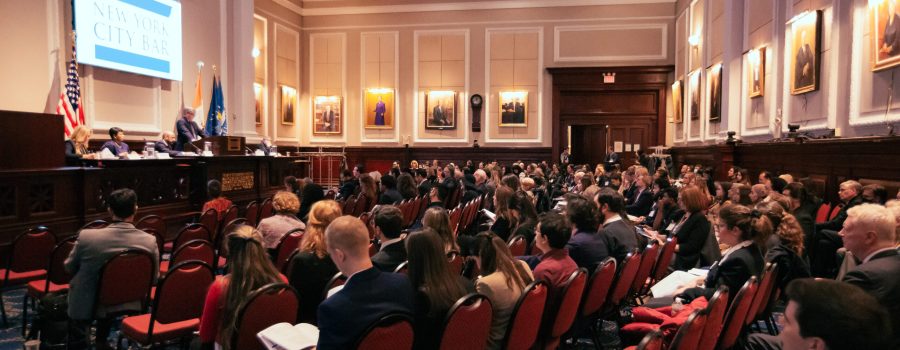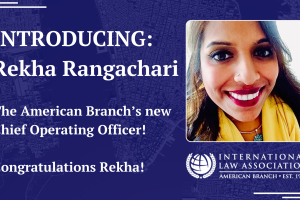ABILA Committees Host Panels and Networking Rooms at ILW 2022
The International Law Association (American Branch) has twenty committees. These committees are the heart of the organization. Committee projects are diverse, ranging from multi-year academic studies (such as the recent book-length treatment of law of the sea terms and concepts undertaken by the Branch’s Law of the Sea Committee), to shorter academic analyses, to advocacy work (such as amicus briefs or congressional testimony about treaties or legislation). Although the American Branch as a whole does not take positions on current international law issues, the Branch’s Committees may. Committees also often propose panels for inclusion at International Law Weekend and sponsor panels at Regional ILWs or stand-alone events.
This year, sixteen ABILA committees organized panels at International Law Weekend 2022 – the premier international law event of the fall season, and the Branch’s annual conference in New York City. Several committees also held networking events to connect with their members and discuss ongoing projects.
The Committee on the Formation of Rules of Customary International Law sponsored a panel at ILW 2022 on The Role of Customary International Law in the Next 100 Years. The panel critically examined what role customary international law can and should play in the next 100 years in light of an expanding universe of sources of law, with a particular focus on the fields of international law of armed conflict, international human rights law, and international space and cyber law. The panel was moderated by Committee Chair Brian Lepard and included Rossana Deplano, Oona Hathaway, Ezequiel Heffes, and Nathalie Weizmann. The Committee also held a networking event after the panel. In the coming year, the Committee plans to continue work on a study of the status of international human rights law as customary international law. Lepard is working on a prospectus for the study.
The Committee on International Environmental and Energy Law (chaired by Myanna Dellinger and Carolina Arlota) worked on different fronts and actively participated in ILW 2022. It sponsored a panel discussing the crucial role of science in informing the need for meaningful reduction of greenhouse gases and collaborative action among all countries against climate change. The panel, Beyond Rocket Science: Assessing the Role of Natural and Social Sciences in Galvanizing International Climate Action, featured Carolina Arlota, Myanna Dellinger, Freddy Sourgens, and Gudny Nielsen. Tibisay Morgandi joined the panel as a young scholar. The Committee also co-hosted a networking room with the Law of the Sea Committee.
The Committee on International Arbitration (chaired by Floriane Lavaud and Daniel Reich) and the Committee on International Investment Law (chaired by David Attanasio and Diora Ziyaeva) jointly led an effort to publicize ILW among the community of international arbitration and investment law practitioners, including arranging for ILW conference reporting for OGEMID. The Committees also published an article reviewing the panels from ILW 2021 that touched on the Committees’ subject matter. Building on that, the Committees had a number of panels at ILW 2022, either sponsored directly or within the general ambit of their mandates, including: Coercive Diplomacy in the Skies: Dispute Resolution Mechanisms and Legal Remedies for States; Accountability in Internet Governance; The Vienna Convention on the Law of Treaties in Investor-State Disputes: History, Evolution, and Future; and Controlling Misimplementation and Misuse of Global Anti-Money Laundering Standards. The Committees plan to organize further conferences aimed at drawing together practitioners and academics to discuss cutting-edge issues in international investment law and international arbitration.
The Committee on the International Criminal Court (chaired by Jennifer Trahan) sponsored the panel Prosecuting Sexual and Gender-Based Crimes at the ICC: An Expert Roundtable featuring Yvonne Dutton, Julie Fraser, Valerie Oosterveld, Priya Pillai, and Milena Sterio. This panel discussed the ICC Office of the Prosecutor’s proposed Gender Persecution Policy. At present, the jurisprudence on gender-based persecution is relatively undeveloped in international criminal law. The OTP’s commitment to implementing a Gender Persecution Policy, however, would allow the ICC to take a leadership role in ending impunity for the perpetrators of gender-based persecution. A broadly formulated and inclusive Gender Persecution Policy could do much to aid in protecting marginalized and oppressed groups who are the victims of this crime. The panelists discussed the importance of taking a broad and inclusive view of the meaning of “gender”; recognizing the guidance that others areas of law, such as refugee law, may provide in determining the range of acts that constitute gender-based persecution; developing a robust victim participation scheme at every stage of a gender persecution prosecution; and ensuring that intersectionality and defense arguments of cultural relativism are properly considered in the prosecution of gender-based persecution.
The Use of Force Committee (chaired by Jack Beard) co-sponsored an ILW 2022 panel on Prosecuting the Crime of Aggression: Russia and Beyond?, moderated by ICC Committee Co-Chair Jennifer Trahan. In light of Russia’s violation of the U.N. Charter, the panel considered the possibilities for prosecuting Russian military and civilian leaders for the crime of aggression. Specific models were discussed, including the creation of an ad hoc tribunal agreed upon between the U.N. and Ukraine, and recommended by the General Assembly. The panel also considered the limited jurisdictional regime that presently exists for the International Criminal Court’s investigation and prosecution of the crime of aggression, and potential ways in which that jurisdiction could be expanded in the future. It will also consider the geopolitical risks to the international system of failing to pursue individual criminal responsibility for the crime, which enforces the core foundation non-aggression provision in Article 2(4) of the U.N. Charter. Other speakers included Jack Beard, David Donat Cattin, Astrid Reisinger Coracini, Ambassador David Scheffer, and Ambassador Christian Wenaweser.
The Committee on International Law in Domestic Courts (chaired by Martin Flaherty and Steven M. Schneebaum) sponsored a panel at ILW 2022 entitled Is U.S. Ratification of Human Rights Treaties Obsolete, moderated by Jamil Dakwar. This year marks the 30th anniversary of the U.S. ratification of the International Covenant on Civil and Political Rights (ICCPR). What has been the impact of this ratification on U.S. domestic and foreign policy? What are the lessons learned from the ICCPR ratification and lack of domestic implementation? The panel assessed the U.S. record (both domestically and internationally) as a State Party to the ICCPR and examined the prospects for new treaty ratification without or with limited Reservations, Understandings and Declarations (RUDs) as well as other possible avenues for domestic implementation and enforcement of the ICCPR and other ratified treaties including in domestic courts. Speakers included Martha Davis, David Kaye, Gay McDougall, and Mariana Olaizola Rosenblat.
The Committee on the Law of the Sea sponsored an ILW 2022 panel entitled “Whose is the Bed of the Sea?” 1922-2022 and Beyond, which addressed the past, present, and future of ownership over, benefits from, and control of, the seabed and subsoil of the continental shelf and deep seabed. Sir Cecil Hurst asked this question in 1923, examining the legal basis of claims to nearshore, shallowwater, sedentary living marine resources (e.g., pearl oysters), one of the only commercially interesting “fructus of the soil” (Hurst’s words) of the seabed at that time. Much has changed in the ensuing century: technological advances have permitted exploitation of new resources, including deep water hydrocarbons and thermophilic organisms, and international rules have emerged and evolved, such as the regimes of the continental shelf and deep seabed. But still, Hurst’s question reverberates: continental shelf outer limits remain undelineated, marine genetic resources in areas beyond national jurisdiction are unregulated, Article 82 payments and contributions have yet to be tested, and the rules for equitable sharing of benefits derived from deep seabed mining are still in formation. Participants included Seline Trevisanut, Cymie Payne, and Kevin Baumert. Committee Chair Coalter Lathrop moderated. The Committee also co-hosted a lively networking session with the Committee on International Environmental and Energy Law.
The Committee on International Human Rights (chaired by Aaron X. Fellmeth and Warren Binford) sponsored the panel Growing Threats to the Human Rights of U.S. Transgender & Intersex Children, moderated by Professor Binford. The 21st century has brought greater understanding that gender non-conformity is relatively common. Research indicates that transgender children experience similar gender development profiles to cisgender children and have similar rates of depression and self-esteem if their gender identity is affirmed. If their identities are not affirmed, the risk of suicide and depression significantly increases. Society has responded by normalizing affirmation of transgender identities, including the development of health care protocols, but some politicians have reacted by introducing, and in some cases, banning, gender-affirming health care, and excluding transgender children from sports, bathrooms, and more. Parents and medical providers are currently being investigated for child abuse because they provided gender-affirming care to their children and/or patients. This panel explored whether international human rights law provides a framework to defend the rights of transgender and intersex children in the domestic context of U.S. state legislation targeting transgender and intersex youth.
The Committee on the Legitimacy and Fundamental Principles of International Law (chaired by Mortimer Sellers) continued its effort to strengthen the value and legitimacy of international law by identifying the fundamental principles that support and justify the international legal order, making practitioners more aware of their content, and identifying and promoting the justice of international legal institutions. Its ILW 2022 panel focused on International Human Rights Law, in cooperation with the International Human Rights Committee. The respect for and protection of universal human rights has long been seen as one of the primary tests and measures of the legitimacy of law and government everywhere. Already in the time of Grotius and Vattel, but with increasing sophistication and frequency since the Second World War, lawyers have cited universal rights and international legal standards to challenge oppressive Empires and States. Yet at the same time, strong traditions of realism and positivism in international relations have threatened the legal status of individual rights, to elevate the power and sovereignty of States at the expense of their subjects. This panel considered the legitimacy and fundamental principles of international human rights law, the sources and evidence of human rights, their binding power, and the possible role human rights protections play in supporting the legitimacy of international law and international legal institutions as a whole. Speakers included Diane Marie Amann, Floria Y.A. Ayeee, Hélène Ruiz Fabri, and Aaron X. Fellmeth.
The Committee on International Humanitarian Law (chaired by Gabor Rona and Ashika Singh) held a networking room during ILW 2022, and sponsored the panel The Cybercrime-Cyberwar Continuum: State Responsibility and Accountability for Cyberattacks under International Law. The panel brought together experts and practitioners from the fields of cyber and humanitarian law to examine critical legal questions that arise when different actors carry out cross-border cyber operations for different purposes—from financially motivated “cybercrime” to hybrid, cyber-kinetic “warfare.” With attention to real-world case studies, the panel considered the factors that might bring a cyberattack within the scope of international humanitarian law and explored unanswered questions of State responsibility and accountability for different types of cyber operations, including those carried out by “private” actors.
The Committee on International Trade Law (chaired by Richard Steinberg) organized a panel on The International Trade Regime’s Foundations in an Era of Increased Geopolitical Conflict at ILW 2022. The panel surveyed developments in international trade law associated with recent and ongoing geopolitical shifts, including Russia’s invasion of Ukraine and China’s revisionist rhetoric and behavior, offering a range of views on present and future trade policy and implications for the global architecture of trade. Kathleen Claussen, Sergio Puig, Kelly Ann Shaw, and Richard H. Steinberg participated as speakers, while the panel was moderated by Matthew Schaefer.
The Committee on United Nations Law (chaired by Christiane Ahlborn and Bart Smit) sponsored an ILW 2022 panel on Negotiating the Sustainable Future of Marine Biological Diversity in Areas Beyond National Jurisdiction. This panel explored the issues at stake, positions, and challenges in the negotiations to conclude a treaty on marine biodiversity in the high seas and international seabed area beyond national jurisdiction. Moderated by Daniel Stewart, speakers included Florian Jean Patrice Botto, Yolannie Cerrato, Ambassador Osman Keh Kamara, Ambassador Michael Imran Kanu, and Clement Yow Mulalap.
The Committee on Islamic Law and Society (chaired by Sahar Aziz) held a well-attended networking room during ILW 2022.
The Space Law Committee (chaired by Henry R. Hertzfeld and Matthew Schaefer) co-sponsored a panel at ILW 2022 along with the Committee on International Trade Law (chaired by Richard H. Steinberg). The panel—The International Trade Regime’s Foundations in an Era of Increased Geopolitical Conflict—looked at the impact of geopolitical conflict on supply chains in aerospace and transport industries and continued the Committee’s tradition of cooperation with other ABILA committees. Which foundations of international trade law should remain and which should be reimagined? In recent years, geopolitical tensions have increased and trade relations between many States have become strained. What could or should trade architecture look like? To what extent can there be a stable, global trade regime in the context of competition, territorial disputes, or war among proxies of
powerful States? Should there be a global trade regime? Should there be a trade regime open only to countries that meet specified economic or political criteria? What impact do such choices have on trade in high-value transport, auto, and aerospace products and supply chains? What should be the guiding principles of the various regimes and relationships among them? This panel explored these questions and more with experts including Matthew Schaefer (moderator), Kathleen Claussen, Mario R. Osorio Hernandez, Sergio Puig, Kelly Ann Shaw, and Richard H. Steinberg.
(The names of ABILA members are bolded).




